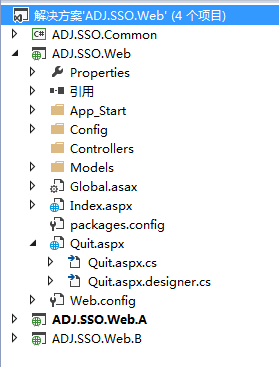.NET基於Redis快取實現單點登入SSO的解決方案
一、基本概念
最近公司的多個業務系統要統一整合使用同一個登入,這就是我們耳熟能詳的單點登入,現在就NET基於Redis快取實現單點登入做一個簡單的分享。
單點登入(Single Sign On),簡稱為 SSO,是目前比較流行的企業業務整合的解決方案之一。SSO的定義是在多個應用系統中,使用者只需要登入一次就可以訪問所有相互信任的應用系統。
普通的登入是寫入session,每次獲取session看看是否有登入就可記錄使用者的登入狀態。
同理多個站點用一個憑證,可以用分散式session,我們可以用redis實現分散式session,來實現一個簡單的統一登入demo
我們在本地IIS建立三個站點
http://www.a.com 登入驗證的站點
http://test1.a.com 站點1
http://test2.a.com 站點2
修改host檔案C:\Windows\System32\drivers\etc下
127.0.0.1 www.a.com
127.0.0.1 test1.a.com
127.0.0.1 test2.a.com
127.0.0.1 sso.a.com
具體實現原理,當用戶第一次訪問應用系統test1的時候,因為還沒有登入,會被引導到認證系統中進行登入;根據使用者提供的登入資訊,認證系統進行身份校驗,如果通過校驗,應該返回給使用者一個認證的憑據--ticket;使用者再訪問別的應用的時候就會將這個ticket帶上,作為自己認證的憑據,應用系統接受到請求之後會把ticket送到認證系統進行校驗,檢查ticket的合法性。如果通過校驗,使用者就可以在不用再次登入的情況下訪問應用系統test2和應用系統test3了。
專案結構

二、程式碼實現
sso.a.com登入驗證站點

<%@ Page Language="C#" AutoEventWireup="true" CodeBehind="Index.aspx.cs" Inherits="ADJ.SSO.Web.Index" %> <!DOCTYPE html> <html xmlns="http://www.w3.org/1999/xhtml"> <head runat="server"> <meta http-equiv="Content-Type" content="text/html; charset=utf-8"/> <title>SSO demo</title> </head> <body> <form id="form1" runat="server"> 用 戶:<input id="txtUserName" type="text" name="userName" /><br /><br /> 密 碼:<input type="password" name="passWord" /><br /><br /> <input type="submit" value="登入" /><br /><br /> <span style="color: red; margin-top: 20px;"><%=StrTip %></span> </form> </body> </html>

程式碼:

public partial class Index : System.Web.UI.Page { //定義屬性 public string StrTip { get; set; } public string UserName { get; set; } public string PassWork { get; set; } protected void Page_Load(object sender, EventArgs e) { if (Page.IsPostBack) { ValidateUser(); } } //登入驗證 private void ValidateUser() { var username = Request.Form["userName"]; if (username.Equals("")) { StrTip = "請輸入使用者名稱"; return; } var password = Request.Form["passWord"]; if (password.Equals("")) { StrTip = "請輸入密碼"; return; } //模擬登入 if (username == "admin" && password == "admin") { UserInfo userInfo=new UserInfo() { UserName = "admin",PassWord = "admin",Info ="登入模擬" }; //生成token var token = Guid.NewGuid().ToString(); //寫入token Common.Common.AddCookie("token", token, Int32.Parse(ConfigurationManager.AppSettings["Timeout"])); //寫入憑證 RedisClient client = new RedisClient(ConfigurationManager.AppSettings["RedisServer"], 6379); client.Set<UserInfo>(token, userInfo); //跳轉回分站 if (Request.QueryString["backurl"] != null) { Response.Redirect(Request.QueryString["backurl"].Decrypt(), false); } else { Response.Redirect(ConfigurationManager.AppSettings["DefaultUrl"], false); } } else { StrTip = "使用者名稱或密碼有誤!"; return; } } }

配置檔案:

<appSettings> <!--sso驗證--> <add key="UserAuthUrl" value="http://sso.a.com/"/> <!--redis伺服器--> <add key="RedisServer" value="192.168.10.121"/> <!--過期時間--> <add key="Timeout" value="30"/> <!--預設跳轉站點--> <add key="DefaultUrl" value="http://test1.a.com/"/> </appSettings>

登出程式碼:
var tokenValue = Common.Common.GetCookie("token"); Common.Common.AddCookie("token",tokenValue,-1); HttpContext.Current.Response.Redirect(ConfigurationManager.AppSettings["DefaultUrl"]);
其他站點驗證是否登入的程式碼:PassportService

public class PassportService { public static string TokenReplace() { string strHost = HttpContext.Current.Request.Url.Host; string strPort = HttpContext.Current.Request.Url.Port.ToString(); string url = String.Format("http://{0}:{1}{2}", strHost, strPort, HttpContext.Current.Request.RawUrl); url = Regex.Replace(url, @"(\?|&)Token=.*", "", RegexOptions.IgnoreCase); return ConfigurationManager.AppSettings["UserAuthUrl"] + "?backurl=" + url.Encrypt(); } public void Run() { var token = Common.Common.GetCookie("token"); RedisClient client = new RedisClient(ConfigurationManager.AppSettings["RedisServer"], 6379); UserInfo userInfo = client.Get<UserInfo>(token); if (userInfo == null) { Common.Common.AddCookie("token", token, -1); //令牌錯誤,重新登入 HttpContext.Current.Response.Redirect(TokenReplace(), false); } else { Common.Common.AddCookie("token", token, Int32.Parse(ConfigurationManager.AppSettings["Timeout"])); } } public UserInfo GetUserInfo() { var token = Common.Common.GetCookie("token"); RedisClient client = new RedisClient(ConfigurationManager.AppSettings["RedisServer"], 6379); return client.Get<UserInfo>(token) ?? new UserInfo(); } }

三、最後看下效果圖

